Netherlands: The children of a country held hostage by drug trafficking
On the edges of society, adolescents navigate the mafias that recruit them and the efforts of police officers, social workers and the few politicians who try to keep them on the side of the law. However, as drug trafficking extends its presence throughout the Netherlands, violence and intimidation are threatening the country’s institutions. This is a portrait of Dutch society that has little to do with the postcards that depict bicycles and tulips
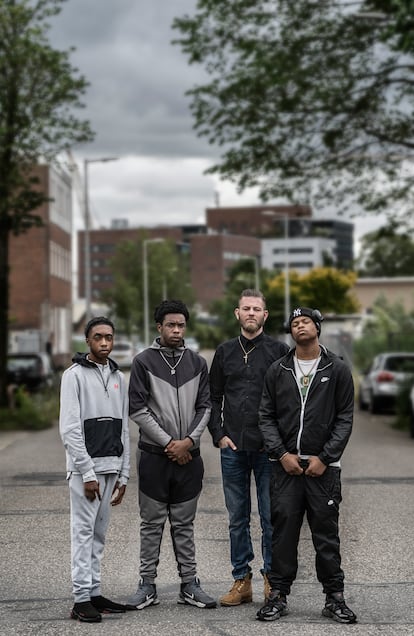
If this report had a soundtrack, the anthem that would accompany us throughout these pages would be the rap of a 16-year-old boy from one of the toughest neighborhoods in Amsterdam. Several local children clasp their fists in greeting and exchange the territorial code with a movement of their fingers. They have neighborhood pride: a sense of belonging and identity. Some of them already have knife scars on their bodies. They all dodge as best they can the violence that leaves homemade bombs and explosions in their streets every day. Welcome to the Netherlands.
“We’re living in a fucked up generation!” raps Jeninhio — known as C6ster — whose voice still rings with the heartbreak of someone who’s no longer a child, but still isn’t an adult. He has a bit of hair above his lips and a cocky gaze beneath the shadow of his dark cap.
Jeninhio belongs to a generation of Dutch youth on edge. He lingers between the attractive call of rising crime — which pays well — and the efforts of schools and organizations to retain (or return) lost youth to the right side of the law. He’s accompanied by 15-year-old Elaijah, who has already been stabbed twice in his young life, and 13-year-old Leonicio. The three move about in the typical uniform of their age and their streets: baggy tracksuits, chains around their necks and hoods up. They have the air of kids who’ve already seen too many things in life, while pretending that they’ve seen even more.
They meet up with EL PAÍS alongside James, who acts as their guide and their coach. He’s 29 and knows how to speak their language. He spent his adolescence in various juvenile prisons, before redirecting his life and becoming a social worker for Adamas, an organization committed to guiding these kids.
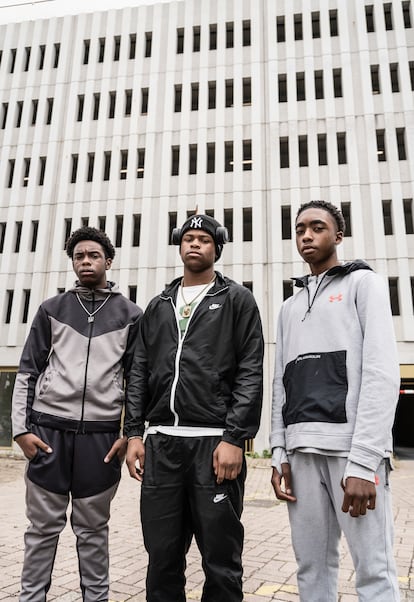
“When I was six or seven, I started having bad feelings,” says Jeninhio, who tells his story between long pauses. “When I was little, my father beat me. I wasn’t in my mind. I started looking for trouble… I went out on the streets to earn money and I did many terrible things.” Many. Terrible. Things.
He stumbled several times until he was introduced to James. Elaijah — who was stabbed twice when he was 13 — barely speaks. Leonicio, meanwhile, got a close-up look at some explosions in Amsterdam this past February, when bombs were set off in retaliation for the killing of a famous rapper named Bigidagoe. The word “WAR” was clearly written on the walls.
Battles between rappers, mafias and rival gangs — all linked to drugs — intersect on a moving map of organized crime. At least 800 bombs were planted in the Netherlands in 2023 alone.
James listens to these young guys. He’s part of their lives: he takes them around, cooks with them and makes music with them. His goal is to be their family and their role model. He works with one of the most difficult schools in Amsterdam and specializes in supporting the most troubled people in the city. “I try to get into their lives and their circles, get to know their parents, their homes. I take them to school, I pick them up. They like to talk to me. And I can understand their struggles. They’re good kids, they’re not [bad]. They’re traumatized and scared. They just need someone to be there with them, for them, supporting them.”
James speaks slowly. His beard, neck tattoo (“till death 1 hundred I stand”) his confident tone, his calm demeanor and his experience all give him credibility in the eyes of the young boys that the Adamas organization tries to guide. He is — as the social workers are called in this group — a “credible messenger.”
“I went to prison for the first time when I was 13 and spent seven years in different types of institutions,” he explains. For drug trafficking? “Among other things, yes,” he answers EL PAÍS with a smile… and without further explanation. “I was also caught for armed robbery. It was a crazy part of my life. That’s now behind me.”
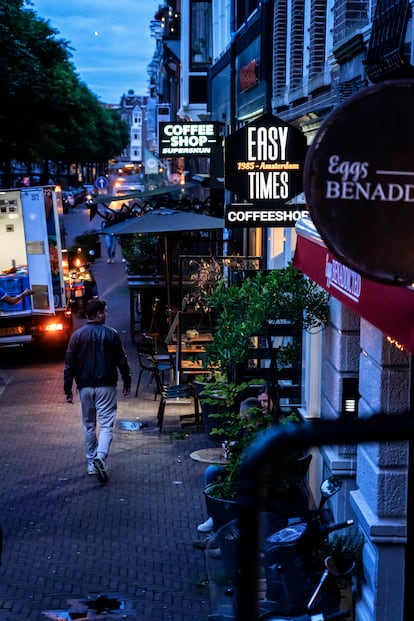
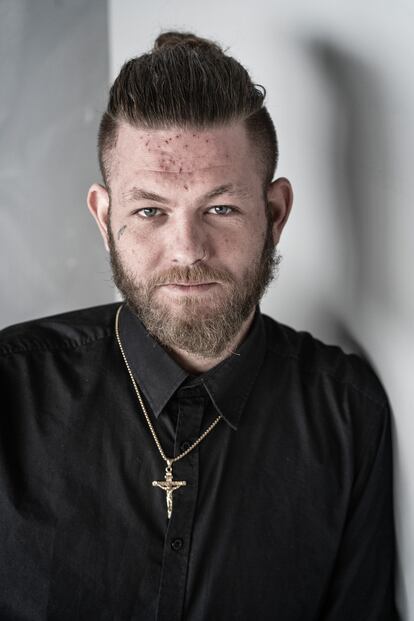
James is the example of the efforts that a certain part of Dutch society is making to stop the disaster that has crept into the country’s social fabric. This crisis began when the tolerance towards the consumption of soft drugs imposed in the 1970s morphed into an environment that, today, many describe as being out of control. The possession of small quantities is legal in the Netherlands, but not production or trafficking, which has spread to synthetic drugs, cocaine and heroin. Hard drugs have circulated in recent years, leading this beautiful, postcard-like country, an economic power, dotted with windmills, tulips and bicycles, to suddenly come to be described as a “narco-state” by police chiefs, the mayor of Amsterdam, the minister of Justice, as well as 59% of citizens. And, if it’s not officially a narco-state, most of the authorities and population still describe the nation as being at high risk of turning into one. According to Europol, half of the 821 criminal networks under investigation on the continent are dedicated to drug trafficking… and the most common nationality of its members is Dutch.
Narco-state. The word alone causes shivers in all the Dutch interviewees and institutions consulted by EL PAÍS. It makes everyone in this upper-income European country uncomfortable to be compared to certain Latin American nations where drug trafficking is rampant. Still, reality is a stubborn thing. The Mocro Maffia — a criminal network that moves tons of cocaine throughout the country and has extended its ties to gangs in Belgium or Spain — is a tangled-up cartel that doesn’t have a pyramidal structure, but rather distributes the risk among different groups, which are sometimes in conflict with each other. They’ve threatened high-profile Dutch citizens, including former prime pinister Mark Rutte and members of the Royal House of the Netherlands. In 2023, the 20-year-old crown princess, Catharina-Amalia of Orange, even had to seek refuge in Spain. “We have large ports, financial and logistical infrastructure, airports… this is the country densest in transportation nodes, a super-modern superhub that makes immense drug trafficking possible. This has laid the groundwork for organized crime,” says Yarin Eski, a professor at the Vrije University of Amsterdam and an expert on the subject.
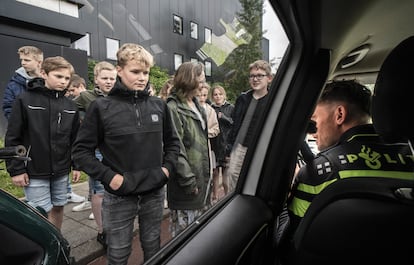
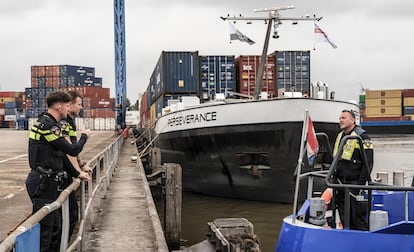
The Mocro Maffia is linked to murders and crimes that have shaken the conscience of a country that had become relaxed in the face of drugs. Following the arrest of one of the mafia’s leaders, Ridouan Taghi, the brother of a protected witness, his lawyer and a journalist who was investigating the case have been murdered, among others. Before that, a decapitated head was placed in front of a coffee shop in Amsterdam. Torture chambers have been found in shipping containers. Across the country, dismembered corpses, bombs and abandonded drug laboratories, located in farms or garages, have turned up. Each year, about 400 arrests of people suspected of trying to retrieve trafficked drugs from the port of Rotterdam are made… a figure that everyone recognizes is just the tip of the iceberg.
These mafias use child soldiers. While the trafficking business used to have its entire distribution chain in the hands of adults, over the last couple of years, children between the ages of 12 and 13 have been used, in exchange for easy money. The mafias usually know them because they live in their neighborhoods. “First, they invite [a kid] to an older boy’s house, where they offer him free weed and video games. Then, they use him for their own dealings: collecting, distributing, planting bombs, stabbing, fighting,” one of the social workers explains. “Soon, the change is visible: they start wearing Gucci clothes, cool sneakers, carrying two cell phones, cash. [When that happens], you already know that they’ve been caught up [in crime],” says Geke Kersten, director of the Leerpark School in Arnhem.
The generals that command this particular army of child soldiers are invisible, oiling a mechanism that preys on neighborhood kids like Elaijah, Leonicio and Jeninhio. These three are Dutch citizens with family origins from Suriname. But no demographic group is untouched by criminal activity. In the words of the mayor of Rotterdam, Ahmed Aboutaleb, integration into criminal groups works better than societal integration: “I don’t care if the name is ‘Mocro Maffia.’ I see Albanians with Italian passports, North Africans who come from Spain, Turks, British citizens, Dutch, Irish... this is the perfect image of collaboration between all the mafias in the world. The integration into crime is perfect.”
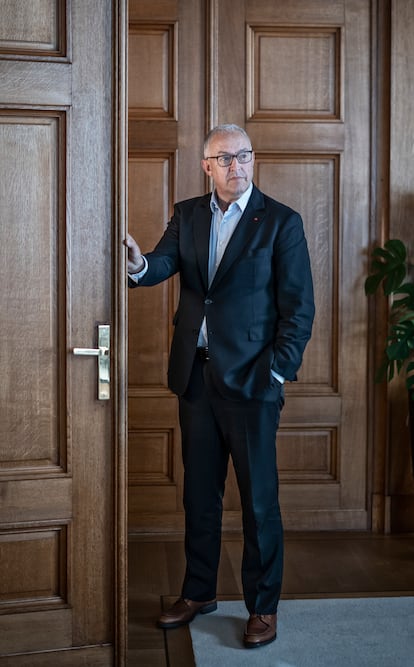
He’s one of the two mayors who have stood out in the Netherlands for trying to put their foot down and stop the recruitment of young boys into gangs. Both men were born in Morocco and both are social democrats. Aboutaleb, 62, became the first Moroccan mayor of a large European city — Rotterdam — in 2009. Ahmed Marcouch, a 55-year-old former police officer and mayor of Arnhem since 2017, has worked so ardently to keep crime out of his medium-sized city that he is known as “the sheriff.” Faced with the more permissive speech of the mayor of Amsterdam, who calls for opening the debate on drug regulation to counteract the mafias, Aboutaleb and Marcouch opt for a firm hand.
Aboutaleb has mobilized to join forces with his colleagues in large port cities such as Antwerp and Hamburg and has traveled to several Latin American countries to try to find solutions. He’s currently leading an initiative for the European Union to try to stop trafficking in the countries where the drugs originate. Marcouch, for his part, knows the terrain well. “When I was a police officer in Amsterdam, we caught traffickers aged 23 to 25… but today, we see 12 and 13-year-olds trafficking. To protect them, we have to fight [crime aggressively], but we also need to invest in education, in the socioeconomic factors that influence them, so that they don’t end up [in a bad place],” he emphasizes. “Municipalities and countries have borders, but organized crime doesn’t. And, when we call it ‘organized,’ it’s because it is, more so than the government when it comes to the battle against crime,” Mayor Marcouch laments. That’s why he has deployed a myriad of street coaches and social workers to the schools and inner-cities, to get to know the neighborhoods inside-out. They can then prevent antisocial behavior and react quickly as soon as the signs are observed.
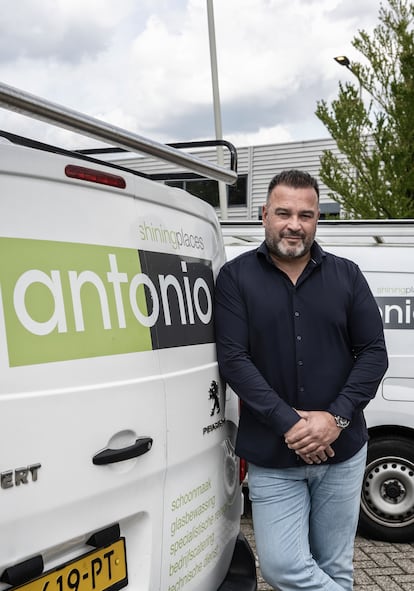
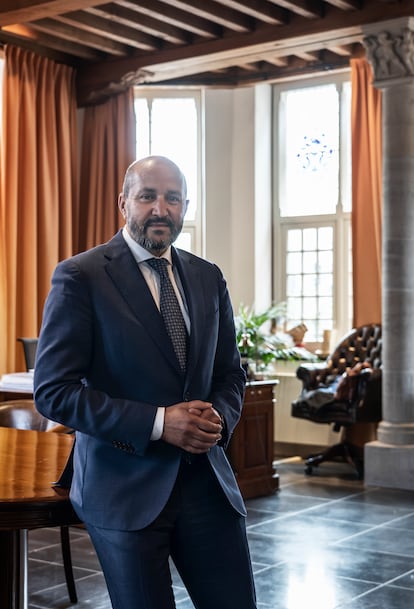
“For 15 years, Dutch governments have neglected this problem, it hasn’t been adequately prioritized,” says Aboutaleb, while speaking with EL PAÍS in the old City Hall building of Rotterdam. The vibrant metropolis of more than 600,000 inhabitants orbits around the largest port in Europe. “Now I see that my young people — the kids from the most vulnerable neighborhoods — have been hired by criminals to do their dirty work. We call them the ‘soldiers of the street.’ They’re paid thousands of dollars if they manage to move large volumes of drugs. That’s why we’ve mobilized.”
Not far from his office is the overwhelming scenery of the port. There’s an ocean of hundreds of thousands of shipping containers that arrive every day from all over the world, brought in and carried by more than 3,000 companies that compete in a port that employs over 100,000 people. The enormous patch of rectangles and colors of the 40-square-mile port extends across the delta where the Rhine and Meuse rivers converge — two of the most powerful river highways in Europe. The Port of Rotterdam is a colossal economic machine. An empire. The most compelling portrait of globalization. Rows and rows of containers of all origins and contents are lined up in a rigorous order, until they disappear into the North Sea. The Port Authority and the Dutch Customs Administration gather information. Like them, kids also don’t go searching at random: they know which container they need to open, because someone told them.
The process is explained to EL PAÍS by an official from the Port Authority who, as a precaution, doesn’t wish to reveal his name. We’ll call him Mark. “[The traffickers] have two ways of approaching [port workers]: first, they reach out gently, to see if you can be useful. If they decide that you will be, they investigate you, they find out where your children go to school, who your wife is, your parents. They track you down in their territory until they approach you and tell you: ‘We know that your children play on this team, that your parents live in such and such a place and your wife is...’ From that point onwards, they can break you,” he affirms. “In [another scenario], they threaten you with a gun, they put money in your pocket and they tell you: ‘You’re going to do something for me.’ You can go to the police… but you know that they’ll come back and find you.”
The director of the Customs Administration himself, Peter Van Buijtenen, concurs with this description. “In the past, we went home in our uniforms. By subway, by train, anywhere. Now, we can’t anymore. And we tell our officials: ‘If you leave here, leave your uniform and change your clothes. Don’t let anyone know that you work here.’”
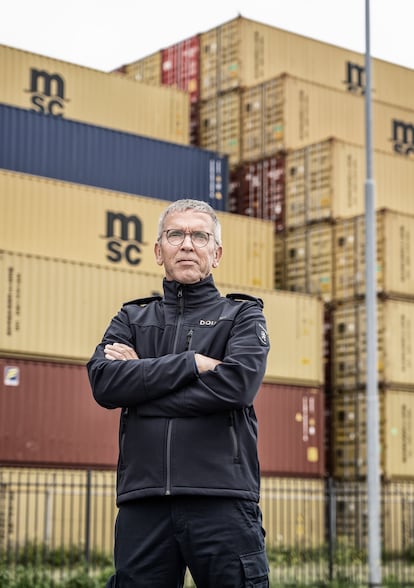
Mark is dedicated precisely to trying to train workers so that they don’t fall into the trap and share information with traffickers… a titanic task in the face of the power of the mafias. In the best case scenario, upon being threatened, employees give up their jobs and look for something that’s less risky. “Many [port workers] leave, others give in… it’s a lot of money and too much pressure.” Van Buijtenen, who has been in Customs for 41 years, has just experienced one of those disappointments that are common here: a 35-year-old colleague has been arrested for corruption. She passed information to the mafias.
It’s always a matter of information. With it, the mafias send the children. And the boys have learned to enter the terminals, sneak into the containers and spend the night there, for several days, until they manage to collect the scattered drugs. They call it a “container hotel,” because inside, they have food, drinks, mattresses, batteries, heaters, dehumidifiers, air fresheners and even toilets. The kids can survive in these conditions until the work is finished.
It’s a cold Friday in June and port police officers speed through the frigid waters aboard their patrol vessel, the P4. They’ve received an alert: a bag with tools belonging to the drug collectors has been found. Its owners abandoned it there before escaping.
The agents remember an occasion when they rescued several boys trapped in their container hotel, without oxygen. “Five or six had been locked up… and who do you think they were going to call? The people who sent them? No. They called us. We were the only ones who were going to rescue them from dying of suffocation,” Hans sighs. He’s one of the agents from the Port Police Unit. His colleague, Danny, takes out a thermos of hot coffee and serves us. We’re grateful, because the cold has seeped into our bones. They’re both old sea dogs: they spent decades in the Dutch navy, served in Yugoslavia, and have sailed around the world. They now work in this police unit..
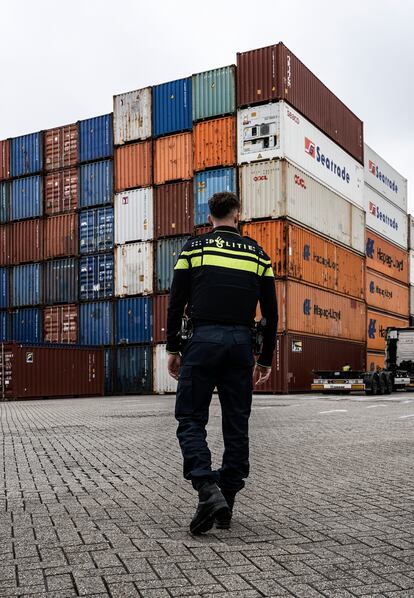
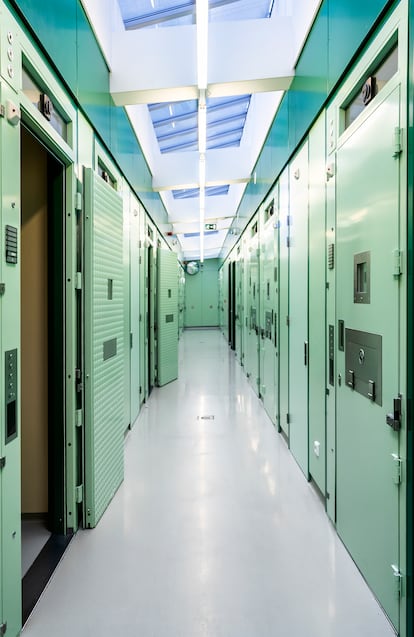
The policing efforts to keep drug trafficking at bay in Rotterdam’s daily life are Herculean. However, they’re also drops in an ocean, given that the mafias move over $200 billion a year in the city, according to the mayor. Inspector Jonathan Abrahamse, an experienced police detective in Rotterdam, tells EL PAÍS that, “every day, we have a murder, a shooting, an explosion. My team [is handling] 75 murders right now.” With the help of the uniformed police, detectives try to unravel the networks that move drugs through the port, while keeping up with the shootings and bombs that occur every day. These bursts of violence arise due to a variety of reasons, such as unpaid debts, a gang sending a message, a jealous boyfriend taking revenge, or a rapper settling a dispute.
“With the bombs, they send a message: ‘We know where you live.’ At the scene of the explosion, it’s impossible to investigate, because they wear hoods and masks,” Abrahamse says. “And they don’t talk. Only when we picked up a mobile phone did we manage to move forward.” There was a record of everything on the device, including photos of kids holding weapons and posing with bags of drugs bigger than them.
Those who set off the bombs must also record the subsequent explosion. The police have even detected cases in which a gang leader forces a bomb to be dropped again, because the video wasn’t good quality. The detective shows EL PAÍS a sketch of kids that he’s managed to put together, after much effort attempting to break up a gang: “This [kid] had 16,000 photos of weapons on his cell phone!”
It’s easy for youngsters to get their hands on a phone. “It costs them €500 ($545) and two hours on Telegram,” he shrugs. “Just like the bombs. They cost only six euros: an explosive [material] called cobra, which comes from Belgium, and some gasoline.”
The detective doesn’t see any light at the end of the tunnel. “I’ve been here for 10 years and I don’t see the light,” Abrahamse says quietly. “Politicians seem to be beginning to understand the problem now… but I’m not optimistic. There are more and more weapons and the kids are younger. Too much extreme violence. It’s a societal failure.”
Abrahamse has hit the nail on the head: societal failure. Mayor Aboutaleb assures EL PAÍS that, between the kids and the mafia bosses who move the drugs, there are at least 10 links in the chain. If someone falls, others will replace them. The job offer — the tempting message that illuminates their lives and their cell phone — reaches them at dawn, in the privacy of their bedrooms. Their parents — if they have any — may be sleeping. “Do you want to make €500?”
Sergeant Reiners de Groen, who patrols the neighborhood with a mission to detect and protect children who may become targets of gangs, knows a lot about all this: “They use poor kids who often don’t have parents present. [They don’t have good grades] and don’t believe that they can get other jobs. [The gangsters] choose them and also coerce them: they wait for them in a car, pull them inside and threaten them. Or they force girls into prostitution: we’ve detected this happening with Bulgarian and Ukrainian girls.” He talks about the female victims of what is referred to as the “lover boy method,” another growing phenomenon. Sergeant Reiners frequently visits schools and tries to explain to young people that these ways of making quick money can lead them to jail, or even get them killed.
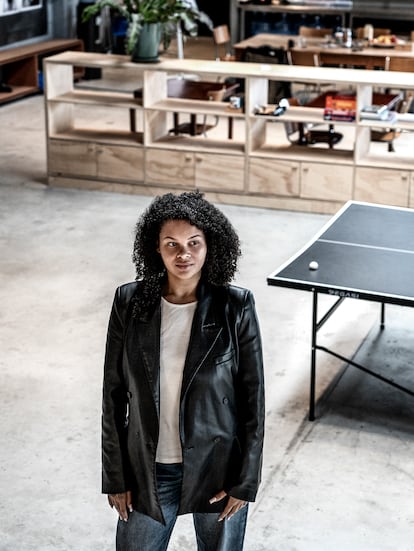
Saviera, one of the charismatic “credible messengers” of the Adamas organization, knows a lot about this forced prostitution, which is different from what takes place in the state-sanctioned shop windows of Amsterdam. Like James, Saviera tries to accompany girls who, today, are suffering through the same thing that she experienced in her childhood:
“I come from a family of abuse and violence,” she tells EL PAÍS. “I’ve seen the street since I was eight years old. I was raped when I was 14. I also took drugs, I dealt drugs…”
Saviera, now 26, has a baby. “My own story teaches me that you’re [on the streets] in search of what you’re missing.” In the Netherlands, she sees how there’s a growing problem of the traffickers using young girls to deal drugs, because they’re less closely monitored than boys. “They quickly become the target of their ‘lover boys.’ Once they’ve fallen in love and have become hooked on drugs, they’ll do whatever they’re asked to do. These are the kind of girls I work with.”
She approaches her job as a kind of older sister, who can listen to the girls without making them feel pressured. She spends time with them, sets an example and guides them.”We’re a reflection of the street. Sometimes, [we succeed]. Other times, we don’t,” she confesses.
Alper, Danny and Jermaine are strattcoachs: they make up a kind of street patrol that tries to keep kids safe from crime in Arnhem. The three of them walk around the area in their exercise clothes and try to quell brawls before they get out of hand… or draw the attention of the police.
“Here, we work in cooperation with schools, coaches, neighborhood [councils], social workers and police to maintain security,” says Hans Jansen, who leads one of the organizations working on the Arnhem School & Safety Foundation. They also monitor social media. “Nowadays, everything starts there. Before, if you wanted to do something bad, you had to go out into the street. But now, the temptation reaches your cell phone, while your parents are sleeping,” says Mustafá Amerizine, from the Am-Support organization.
The essentials to this social effort include sports, mentoring, helping students with their homework and offering part-time work. Toni Íñiguez, a Dutchman of Spanish origin, presides over the Chamber of Commerce and has managed to get work placements for more than 120 young people, so as to remove them from the risks of crime. Another group, Young Talents, an organization from Rotterdam, gets hundreds of kids involved in soccer and other activities, such as learning how to style hair. “It’s about creating a kind of community where [young people] establish healthy ties and feel protected,” says Cem Sahiner, one of the counsellors.
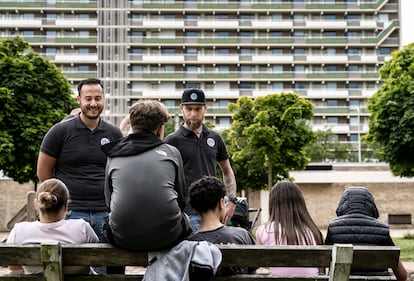
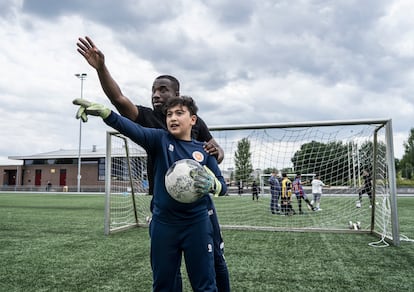
The efforts are enormous, but so are the feelings of helplessness. “This is undermining our democratic system, our rule of law. It infects our institutions, because drug use has been normalized,” says Mayor Marcouch. He thinks that, alongside the debate on legalization, there should be an emphasis on consumer responsibility. “When people buy clothing made by children, everyone knows that it’s unethical. And all drug consumers know that every gram has blood on it. For a long time, the police haven’t made this a priority. Not even with all the murders that have surrounded the Taghi trial.”
In a secret complex in an Amsterdam suburb, where the largest criminal trial in Dutch history wrapped up earlier this year, Ridouan Taghi was sentenced to life imprisonment for several murders. Another 16 ringleaders also received sentences.
The powerful rap of C6ster (“living in a fucked-up generation”) continues to play in an Amsterdam studio. The three teenagers who we met at the beginning of this report gather under the protection of their caps and hoods. Taking on a manly tone, they express their aspirations: Elaijah wants to be an architect, or a kickboxer. Leonicio, an artist. And C6ster, a rapper. In fact, he already is. A great young rapper, who comes from what he describes as “a fucked-up generation.” He’s someone who, without a doubt, we’ll all get to listen to.
Translated by Avik Jain Chatlani
Sign up for our weekly newsletter to get more English-language news coverage from EL PAÍS USA Edition
Tu suscripción se está usando en otro dispositivo
¿Quieres añadir otro usuario a tu suscripción?
Si continúas leyendo en este dispositivo, no se podrá leer en el otro.
FlechaTu suscripción se está usando en otro dispositivo y solo puedes acceder a EL PAÍS desde un dispositivo a la vez.
Si quieres compartir tu cuenta, cambia tu suscripción a la modalidad Premium, así podrás añadir otro usuario. Cada uno accederá con su propia cuenta de email, lo que os permitirá personalizar vuestra experiencia en EL PAÍS.
¿Tienes una suscripción de empresa? Accede aquí para contratar más cuentas.
En el caso de no saber quién está usando tu cuenta, te recomendamos cambiar tu contraseña aquí.
Si decides continuar compartiendo tu cuenta, este mensaje se mostrará en tu dispositivo y en el de la otra persona que está usando tu cuenta de forma indefinida, afectando a tu experiencia de lectura. Puedes consultar aquí los términos y condiciones de la suscripción digital.









































